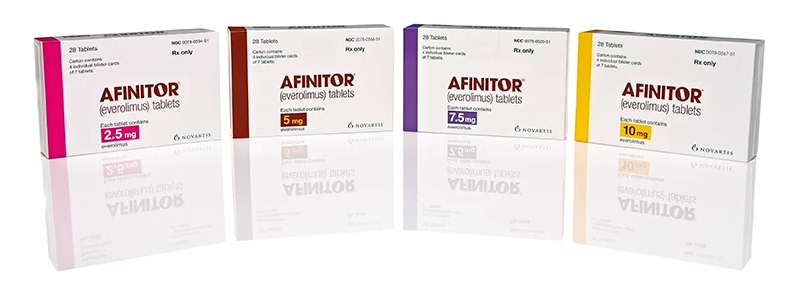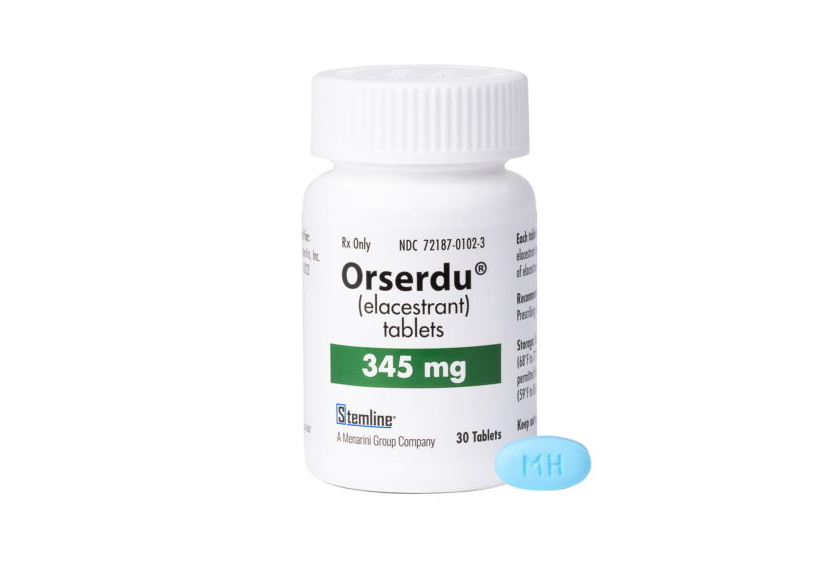Afinitor (everolimus) vs Orserdu (elacestrant)
Afinitor (everolimus) vs Orserdu (elacestrant)
Afinitor (everolimus) is a targeted therapy known as an mTOR inhibitor, primarily used to treat certain types of cancers such as advanced renal cell carcinoma, breast cancer, and neuroendocrine tumors. Orserdu (elacestrant) is a selective estrogen receptor degrader (SERD), which is indicated for the treatment of estrogen receptor-positive (ER+) breast cancer in postmenopausal women and adult men. When deciding between these medications, it is crucial to consider the specific type of cancer being treated, as Afinitor has a broader range of cancer indications, while Orserdu is specifically tailored for ER+ breast cancer, and the decision should be made in consultation with an oncologist based on the patient's individual medical history and the molecular characteristics of their cancer.
Difference between Afinitor and Orserdu
| Metric | Afinitor (everolimus) | Orserdu (elacestrant) |
|---|---|---|
| Generic name | Everolimus | Elacestrant |
| Indications | Advanced hormone receptor-positive, HER2-negative breast cancer, pancreatic neuroendocrine tumors (PNETs), advanced renal cell carcinoma, subependymal giant cell astrocytoma (SEGA), renal angiomyolipoma, tuberous sclerosis complex (TSC) | ER+/HER2- advanced or metastatic breast cancer |
| Mechanism of action | mTOR inhibitor | Estrogen receptor antagonist |
| Brand names | Afinitor, Zortress, Votubia | Orserdu |
| Administrative route | Oral | Oral |
| Side effects | Mouth ulcers, infections, rash, fatigue, diarrhea, decreased appetite, edema, stomatitis, cough, headache, dyspnea, pyrexia, abdominal pain | Nausea, vomiting, constipation, fatigue, increased liver enzymes, decreased appetite, anemia |
| Contraindications | Hypersensitivity to everolimus or other rapamycin derivatives | Not yet fully established; hypersensitivity to elacestrant may be a contraindication |
| Drug class | mTOR inhibitor, immunosuppressant | Selective estrogen receptor degrader (SERD) |
| Manufacturer | Novartis | Radiant Pharmaceuticals |
Efficacy
Efficacy of Afinitor (Everolimus) in Breast Cancer
Afinitor (everolimus) is a medication that has been approved for use in combination with exemestane for the treatment of postmenopausal women with advanced hormone receptor-positive, HER2-negative breast cancer. This indication is specifically for those who have previously received treatment with letrozole or anastrozole. Everolimus works by inhibiting the mammalian target of rapamycin (mTOR), a protein that plays a critical role in the growth and proliferation of cancer cells. Clinical trials have demonstrated that the addition of everolimus to exemestane significantly prolonged progression-free survival compared to exemestane alone, indicating its efficacy in slowing the progression of the disease.
However, it is important to note that while Afinitor has shown efficacy in improving progression-free survival, overall survival benefits have been less clear, and the treatment may be associated with a range of side effects. The decision to use Afinitor in the treatment regimen should be based on a comprehensive assessment of the patient's individual clinical profile and discussion of the potential risks and benefits.
Efficacy of Orserdu (Elacestrant) in Breast Cancer
Orserdu (elacestrant) is a newer agent in the class of drugs known as selective estrogen receptor degraders (SERDs). It is designed to target and degrade the estrogen receptor, thereby inhibiting the growth of estrogen receptor-positive breast cancer cells. While Orserdu is still under clinical investigation, early-phase trials have shown promising results in terms of its efficacy in patients with advanced or metastatic estrogen receptor-positive breast cancer who have received prior endocrine therapy.
As of the knowledge cutoff date, Orserdu is undergoing further clinical trials to better understand its efficacy and safety profile. The results of these studies will provide more definitive evidence regarding its potential as a treatment option for patients with breast cancer. It is important for healthcare providers to stay informed about the latest clinical data to make evidence-based decisions regarding the use of new medications like Orserdu in the management of breast cancer.
Regulatory Agency Approvals
Afinitor
-
European Medical Agency (EMA), European Union

-
Food and Drug Administration (FDA), USA

-
Health Canada

-
Pharmaceuticals and Medical Devices Agency (PMDA), Japan

-
Therapeutic Goods Administration (TGA), Australia

Orserdu
-
Food and Drug Administration (FDA), USA

Access Afinitor or Orserdu today
If Afinitor or Orserdu are not approved or available in your country (e.g. due to supply issues), you can access them via Everyone.org.
How it works

Make an enquiry
Choose the medicine you want to buy, answer a couple of questions, and upload your prescription to speed things up. We’ll get back to you within 24 hours.


Make an enquiry
Choose the medicine you want to buy, answer a couple of questions, and upload your prescription to speed things up. We’ll get back to you within 24 hours.


Breeze through the paperwork
We'll guide you through the required documents for importing unapproved medicine, ensuring you have all the necessary information.


Get a personalized quote
We’ll prepare a quote for you, including medicine costs and any shipping, administrative, or import fees that may apply.


Receive your medicine
Accept the quote and we’ll handle the rest - sourcing and safely delivering your medicine.

Some text on this page has been automatically generated. Speak to your physician before you start a new treatment or medication.
Let's talk
If you have any questions, call us or send us a message through WhatsApp or email:
Contact us




